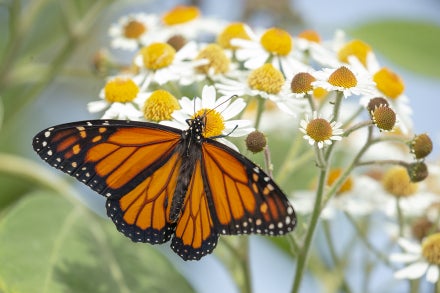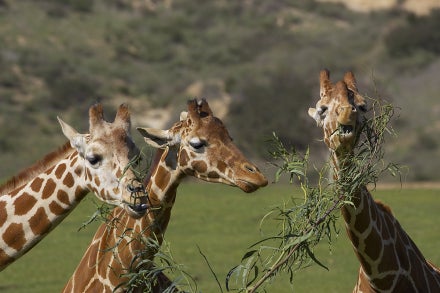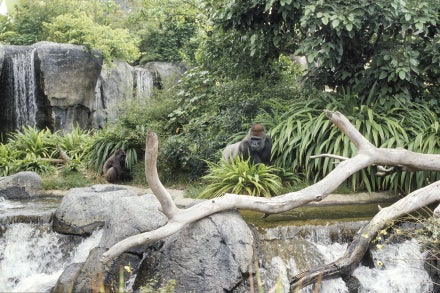Image

Zoo animal care staff, veterinarians, and Espacios Naturales staff in Mexico are working together to hand rear baby Peninsular pronghorn antelopes in the El Vizcaino Biosphere Preserve in Baja California Sur, Mexico to create an insurance population for the dwindling species. Experienced staff from the San Diego Zoo Safari Park, the Los Angeles Zoo, The Living Desert, Sedgwick County Zoo, and the El Paso Zoo are assisting staff from Espacios Naturales to hand rear fawns for transfer to the Los Angeles Zoo and Chapultepec Zoo in Mexico City.
 “Espacios Naturales brought us in on this project in 2002 because they saw the population of Peninsular pronghorn was declining,” said Jeff Holland, curator of mammals at the Los Angeles Zoo. “With a very small population remaining in the wild and the only captive herd of this subspecies located at one facility, we felt we should have a back-up captive population in the U.S. in case a disease outbreak affected that one population. Essentially, we didn’t want to have all of our eggs in one basket. We brought the fawns back to the U.S. in 2007 to establish an insurance population for the species.”
“Espacios Naturales brought us in on this project in 2002 because they saw the population of Peninsular pronghorn was declining,” said Jeff Holland, curator of mammals at the Los Angeles Zoo. “With a very small population remaining in the wild and the only captive herd of this subspecies located at one facility, we felt we should have a back-up captive population in the U.S. in case a disease outbreak affected that one population. Essentially, we didn’t want to have all of our eggs in one basket. We brought the fawns back to the U.S. in 2007 to establish an insurance population for the species.”
 Before the young fawns can be transferred from the El Vizcaino Biosphere Preserve to the Los Angeles Zoo and Chapultepec Zoo, it is vital that the animals are hand reared by animal care and veterinary staff. “Pronghorns by nature are a flighty species and can become stressed very easily,” said Holland. “We hand rear the fawns, which is bottle feeding them, in order to reduce the stress.” The fawn’s move to their new home is easier and more relaxed when they are well conditioned and can be safely transferred.
The Peninsular pronghorn is one of the most endangered large mammals in Mexico. Although it once ranged throughout the Baja Peninsula and Southern California regions, the population has been severely reduced by hunting, habitat destruction, and cattle ranching and it is considered to be a critically endangered species.
Before the young fawns can be transferred from the El Vizcaino Biosphere Preserve to the Los Angeles Zoo and Chapultepec Zoo, it is vital that the animals are hand reared by animal care and veterinary staff. “Pronghorns by nature are a flighty species and can become stressed very easily,” said Holland. “We hand rear the fawns, which is bottle feeding them, in order to reduce the stress.” The fawn’s move to their new home is easier and more relaxed when they are well conditioned and can be safely transferred.
The Peninsular pronghorn is one of the most endangered large mammals in Mexico. Although it once ranged throughout the Baja Peninsula and Southern California regions, the population has been severely reduced by hunting, habitat destruction, and cattle ranching and it is considered to be a critically endangered species.
 “I think this project is important because there are such a low number of this species left.” said Katie Delk D.V.M.,veterinary resident at the San Diego Zoo Safari Park. “So every baby is important for the survival of the species.”
The Peninsular Pronghorn Recovery Project, begun by Espacios Naturales and later joined by the Los Angeles Zoo in 2002, seeks to build a comprehensive and multifaceted conservation program through the restoration of pronghorn habitat, establishing sustainable populations of the species in managed habitats in the wild and as an insurance population in accredited zoos.
“I think this project is important because there are such a low number of this species left.” said Katie Delk D.V.M.,veterinary resident at the San Diego Zoo Safari Park. “So every baby is important for the survival of the species.”
The Peninsular Pronghorn Recovery Project, begun by Espacios Naturales and later joined by the Los Angeles Zoo in 2002, seeks to build a comprehensive and multifaceted conservation program through the restoration of pronghorn habitat, establishing sustainable populations of the species in managed habitats in the wild and as an insurance population in accredited zoos.
 “Espacios Naturales brought us in on this project in 2002 because they saw the population of Peninsular pronghorn was declining,” said Jeff Holland, curator of mammals at the Los Angeles Zoo. “With a very small population remaining in the wild and the only captive herd of this subspecies located at one facility, we felt we should have a back-up captive population in the U.S. in case a disease outbreak affected that one population. Essentially, we didn’t want to have all of our eggs in one basket. We brought the fawns back to the U.S. in 2007 to establish an insurance population for the species.”
“Espacios Naturales brought us in on this project in 2002 because they saw the population of Peninsular pronghorn was declining,” said Jeff Holland, curator of mammals at the Los Angeles Zoo. “With a very small population remaining in the wild and the only captive herd of this subspecies located at one facility, we felt we should have a back-up captive population in the U.S. in case a disease outbreak affected that one population. Essentially, we didn’t want to have all of our eggs in one basket. We brought the fawns back to the U.S. in 2007 to establish an insurance population for the species.”
 Before the young fawns can be transferred from the El Vizcaino Biosphere Preserve to the Los Angeles Zoo and Chapultepec Zoo, it is vital that the animals are hand reared by animal care and veterinary staff. “Pronghorns by nature are a flighty species and can become stressed very easily,” said Holland. “We hand rear the fawns, which is bottle feeding them, in order to reduce the stress.” The fawn’s move to their new home is easier and more relaxed when they are well conditioned and can be safely transferred.
The Peninsular pronghorn is one of the most endangered large mammals in Mexico. Although it once ranged throughout the Baja Peninsula and Southern California regions, the population has been severely reduced by hunting, habitat destruction, and cattle ranching and it is considered to be a critically endangered species.
Before the young fawns can be transferred from the El Vizcaino Biosphere Preserve to the Los Angeles Zoo and Chapultepec Zoo, it is vital that the animals are hand reared by animal care and veterinary staff. “Pronghorns by nature are a flighty species and can become stressed very easily,” said Holland. “We hand rear the fawns, which is bottle feeding them, in order to reduce the stress.” The fawn’s move to their new home is easier and more relaxed when they are well conditioned and can be safely transferred.
The Peninsular pronghorn is one of the most endangered large mammals in Mexico. Although it once ranged throughout the Baja Peninsula and Southern California regions, the population has been severely reduced by hunting, habitat destruction, and cattle ranching and it is considered to be a critically endangered species.
 “I think this project is important because there are such a low number of this species left.” said Katie Delk D.V.M.,veterinary resident at the San Diego Zoo Safari Park. “So every baby is important for the survival of the species.”
The Peninsular Pronghorn Recovery Project, begun by Espacios Naturales and later joined by the Los Angeles Zoo in 2002, seeks to build a comprehensive and multifaceted conservation program through the restoration of pronghorn habitat, establishing sustainable populations of the species in managed habitats in the wild and as an insurance population in accredited zoos.
“I think this project is important because there are such a low number of this species left.” said Katie Delk D.V.M.,veterinary resident at the San Diego Zoo Safari Park. “So every baby is important for the survival of the species.”
The Peninsular Pronghorn Recovery Project, begun by Espacios Naturales and later joined by the Los Angeles Zoo in 2002, seeks to build a comprehensive and multifaceted conservation program through the restoration of pronghorn habitat, establishing sustainable populations of the species in managed habitats in the wild and as an insurance population in accredited zoos.



